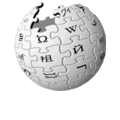As Wikipedia celebrates its 15th anniversary, OU Learning and Teaching Librarian Geraldine Smith explains the pros and cons of using it for study…
Wikipedia celebrates being 15 years old on 15th January 2016. What it is?
Set up in 2001 Wikipedia is one of the largest reference websites on the internet and as of September 2015 it had more than 35,000,000 articles in 290 languages. Despite its size, it is quick and easy to find information and can be a great starting point, whether for personal use or study purposes.
However, before relying on it, you need to be aware of how information is added to Wikipedia, the editorial policy and the importance of evaluating what you find.
 How do people contribute?
How do people contribute?
Anyone can contribute and edit Wikipedia, so the contributor does not have to be an expert on a topic. This can lead to instances where the information is incorrect, either by mistake or deliberately. This could have serious implications if you are relying on it for a diagnosis as outlined in ‘Trust your doctor, not Wikipedia, say scientists’. On a more humorous level, amending your entry could enable you to meet your favourite band: This ‘legend’ changed a Wikipedia page to sneak backstage at gig.
Is it trusted?
Despite these examples, YouGov research has found that British people trust Wikipedia more than the news. The research states that ‘around two thirds of British people trust the authors of Wikipedia entries to tell the truth’. This is even though the site itself acknowledges the advantages and disadvantages of having an open contribution system.
What about editorial policy? What’s expected of a contributor?
The Wikipedia: About page provides guidance on using the site, article quality, contributing and editorial policy. It also has a style and content manual and various methods for dealing with the most common abuses. These include intentional vandalism, unresolved disputes between editors and where a contributor abuses their account. Contributors are expected to write with a neutral point of view and to verify the content they provide by citing references, so readers can check the original source of the information.
Writing accurate articles is included in Wikipedia’s fundamental principles known as the five pillars and where errors in their articles have been reported in mainstream media, corrections have been made. Wikipedia therefore, can provide good quality information, but you do need to evaluate what you find.
 What’s the best way to use the site and measure the ‘trustworthiness’ of an entry?
What’s the best way to use the site and measure the ‘trustworthiness’ of an entry?
When evaluating a Wikipedia article there are various questions to keep in mind to help you judge its trustworthiness. To help you systematically remember what to look for, the OU Library has developed PROMPT, a system which can be used for studies and to help choose information for personal use too. PROMPT stands for:
Presentation
Relevance
Objectivity
Method
Provenance
Timeliness
To help you get the most out of using this criteria the OU Library offers an evaluation activity using the PROMPT principles.
Wikipedia also provides tools to help, such as the ‘Talk’ tab on each article, which is an area for people to make comments about the content of the article, its relevance and accuracy. Further guidance on evaluating Wikipedia is available.
Should ‘researchers’ proceed with caution?
Overall, Wikipedia can provide access to good quality information and be a useful starting point for research. It can also be a helpful place to start gathering definitions and related concepts and keywords to use while carrying out your research.
However, you do need to treat it with caution and consider the trustworthiness of any article. For examples of inaccuracies on Wikipedia you may like to look at this list of hoaxes which evaded detection for at least a year.



